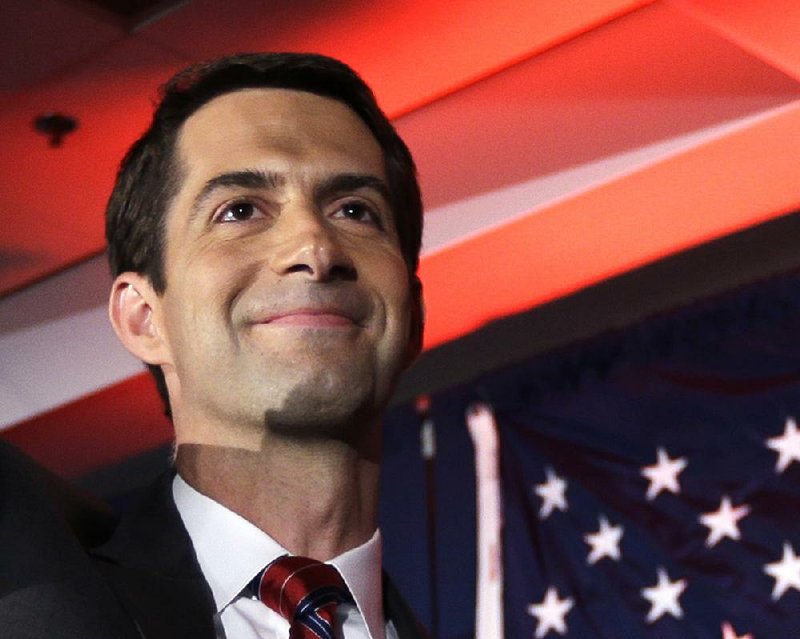WASHINGTON -- In a letter drafted by Arkansas' U.S. Sen. Tom Cotton, Republican senators warned Iran on Monday that President Barack Obama can't negotiate a binding nuclear deal without congressional approval.
The open letter to leaders of the Islamic Republic signed by 47 Republicans noted that without congressional approval any deal agreed to by Obama and Iran can be revoked when the president leaves office in 2017.
The United States, several other world powers and Iran have agreed on a July 1 deadline to complete the drawn-out negotiations over Iran's nuclear program. An initial framework for the deal is due late this month. The pact would need to be endorsed by a U.N. Security Council resolution and is expected to last for at least 10 years. It would limit Iran's capacity to enrich uranium and provide for routine checks by international nuclear inspectors. In exchange, countries would ease economic sanctions on Iran.
"We will consider any agreement regarding your nuclear-weapons program that is not approved by the Congress as nothing more than an executive agreement between President Obama and [Iran's Supreme Leader] Ayatollah Khamenei," the letter states. "The next president could revoke such an executive agreement with the stroke of a pen and future Congresses could modify the terms of the agreement at any time."
Cotton, of Dardanelle, said by phone that "we simply want Iran's leaders to know that a deal not approved by Congress won't be accepted by Congress now or in the future."
The letter drew a swift rebuke from the White House, with press secretary Josh Earnest calling the letter "the continuation of a partisan strategy to undermine the president's ability to conduct foreign policy and advance our national security interests around the globe."
Speaking to reporters in the Oval Office, Obama also responded, saying it is "ironic" to see some members of Congress on the same side as "hard-liners in Iran."
"It's an unusual coalition," he said, adding that he's focused on reaching a deal. "Once we do -- if we do -- then we'll be able to make the case to the American people, and I'm confident we'll be able to implement it."
Appearing on CNN's The Lead with Jake Tapper, Cotton responded, "there's nothing but hard-liners in Iran, nothing but hard-line Islamic extremists that have been killing Americans [around the world] for 35 years. That's why Iran cannot be allowed to get a nuclear weapon."
A bipartisan group of senators has filed legislation that would require congressional approval before any nuclear agreement between the U.S. and Iran could be finalized. Democrats have sought to delay any action on it until after the March 24 deadline.
Cotton said a deal with an end date that also allows Iran to enrich uranium is unacceptable.
"I support a good deal that stops Iran from getting a nuclear weapon today, tomorrow, 10 years from now and forever," he said. "We're simply saying that Iran cannot have a nuclear weapon."
Agence France-Presse reported Monday that Iranian Foreign Minister Mohammad Javad Zarif told Iranian news media the letter is a "propaganda ploy" and that the writers don't understand international law. Zarif, who has a doctorate in international law and policy from the University of Denver, has been the chief negotiator for the Iranians.
"Any congressional action to prevent the implementation of any agreement will violate the international commitments of the [U.S.] government," he said. "The world is not just in America."
Cotton said by phone that experts on Iran say Iran's leaders don't understand American law. Cotton has a law degree from Harvard University.
"The foreign minister's response demonstrates the need for the letter in the first place, because it is a basic principle of America's Constitution that Congress approves major international agreements," Cotton said.
Cotton serves on the Senate Armed Services and Intelligence committees. He has been very vocal about the negotiations over the past few months. He has said Congress should pass crippling sanctions against Iran, make it clear the U.S. is willing to use military force to incapacitate Iran's nuclear program, and consider giving Israel more weapons.
"I personally think that we should have never started these negotiations. I thought the best way to stop Iran from getting nuclear weapons were the sanctions in place in late 2013 and the sanctions I voted for in the House of Representatives, which would have tightened the screws even more," he said Monday.
Cotton is a former Army captain who served tours in Afghanistan and Iraq.
All but seven of the Senate's 54 Republicans signed the letter. No Democrat signed it.
Cotton was presiding, or leading legislative business in the chamber, Monday afternoon when Senate Democratic leader Harry Reid, D-Nev., criticized the letter as "petty" and "juvenile" on the Senate floor.
"The judgment of my Republican colleagues seems to be clouded by their abhorrence of President Obama. The Republican senators sent a letter to the Iranian leadership aimed at sabotaging these negotiations," Reid said. "It's unprecedented for one political party to directly intervene in an international negotiation with the sole goal of embarrassing the president."
Cotton disagreed, saying afterward by phone: "To say that the United States will reach a nuclear weapons agreement with the world's leading state sponsor of terrorism and that we will not have any role for Congress to approve or disapprove that agreement is unprecedented."
Metro on 03/10/2015
